- Home
- Shelby Foote
The Civil War: A Narrative: Volume 2: Fredericksburg to Meridian Page 8
The Civil War: A Narrative: Volume 2: Fredericksburg to Meridian Read online
Page 8
The first sign they had that they were not going to make it—at least not on schedule—came later that morning, twelve miles down the pike, when they encountered long-range cannonfire as they were approaching Illinois Creek. Soon they saw that the Confederates had drawn a line of battle around the hilltop village of Prairie Grove, a couple of miles beyond the creek, blocking the path of the road-worn bluecoats eight miles short of their goal. Herron shook out a regiment of skirmishers and advanced them to the protection of the creekbank, where to his horror he discovered that his men were so weary that once they were off their feet they promptly dropped to sleep with rebel shells and bullets whistling and twittering over their heads. Undaunted, he built up his firing line and put his batteries in position, partly by way of returning the hostile fire, but mostly by way of letting Blunt know from the racket that he had arrived, or almost arrived, and needed help. The trouble was, with all those graybacks swarming in his front, he was not even sure that Blunt and his men were still in existence. For all he knew, Hindman might have gobbled them up while he himself was on the march from Wilson’s Creek.
Hindman had not gobbled up Blunt; he had gone around him. Approaching Cane Hill late the afternoon before, after a march across the shoulder of the mountains in weather so cold that water froze in the men’s canteens and icicles tinkled on the beards of the horses, he had put his troops in position for a dawn attack, only to learn that Herron was on the way, already approaching Fayetteville with a force which, once it was joined to Blunt’s, would give the Federals the advantage of numbers, both in men and guns. In command of a brigade at Shiloh, where he had been wounded and commended for gallantry, Hindman decided to profit from the example of that battle by preventing what had caused its loss, the arrival of Buell after Grant had been pushed to the edge of desperation. That is, he would strike at the reinforcements first, then turn on the main body. Accordingly, he built up the campfires along his outpost line, left a skeleton brigade of cavalry to keep up the bluff next morning, and set off after moonset on a circuitous march with 10,000 men to intercept and defeat the blue column hurrying southward out of Fayetteville. That was how it came about that Herron encountered long-range cannonfire at the crossing of Illinois Creek and the bristling line of battle at Prairie Grove, eight miles short of a junction with Blunt at Cane Hill.
Blunt had spent the morning in constant expectation of being swamped by the rebels maneuvering boldly to his front, apparently in overwhelming numbers. Near noon, however, hearing the sudden boom of guns from across the hills to his left rear, he realized that he had been outflanked; whereupon he fell back hastily to Rhea’s Mills, six miles north, in order to protect his trains. Finding them secure he turned southeast in the direction of the booms and at 4 o’clock reached Prairie Grove, where he came upon the battle still in full swing after nearly five hours of doubtful contest. Two rounds from his lead battery announced his arrival—announced it all too emphatically, in fact, for both shots landed among Herron’s skirmishers, causing them to think that they were being flanked by their foes instead of being supported by their friends. Herron had been holding his own despite the weariness of his foot-sore men. Two charges against the ridge had failed, breaking in blood against the rim of the rebel horseshoe line, but Hindman had had no better luck in attempting a counterattack with his green conscripts, who fell apart whenever he ordered them forward. The fighting continued, left and right, muzzle flashes stabbing the early darkness. Despite their superiority of numbers, especially in guns—42 to 22, now that the Union forces were united—Blunt’s fresh troops could make no more of a penetration of the rebel line than Herron’s weary ones had been able to achieve. Gradually the firing died to a sputter. Then it stopped. The battle was over.
Losses in killed, wounded, and missing totaled 1317 for the Confederates and 1251 for the Federals. Of the latter only 333 were from Blunt’s command, indicating how much heavier a proportion of the conflict Herron’s men had borne, despite the fact that both laid claim to a lion’s share in having brought the victory about. Hindman’s only claim in that respect was the not inconsiderable one that he had managed to hold his ground throughout the fighting. Whether he had also accomplished his main objective—to shock the enemy into immobility, escaping pursuit while he fell back southward in compliance with the previous orders from Holmes—would soon be known; for he retreated that night under cover of darkness, wrapping the iron tires of his gun and caisson wheels with blankets to muffle the sound of his withdrawal. The ruse worked, and so did another he tried next morning. Not only did Blunt not hear him go, but at dawn he also granted a request for a truce, which Hindman sent forward under a white flag, to allow for tending the wounded and burying the dead. Discovering presently that the Confederate main body had departed in the night, Blunt canceled the truce, on grounds that the rebels were gleaning abandoned arms from the field, and prepared to follow. By that time, however, Schofield was on the scene. Up from his sickbed and furious that his army had been committed to battle in his absence, he censured both commanders: Blunt for not withdrawing to meet the reinforcements hurrying toward him, and Herron for attacking with troops so badly blown that some of them were found dead on the field, not from wounds but from exhaustion and exposure after their long march from Wilson’s Creek. If Schofield’s purpose in this was to prevent his subordinates’ advancement by discrediting their valor, that purpose failed. By way of showing its appreciation for a victory won by northern arms as the year drew to a close—a victory which presently shone the brighter by contrast with the several full-scale disasters that developed elsewhere along the thousand-mile-long firing line before the month was out—the government promptly awarded major general’s stars not only to Blunt but also to Herron, who then succeeded Lew Wallace as the youngest man to hold that rank in the U.S. Army. Moreover, as soon as these promotions came through, both men would outrank their present commander.
Hindman’s discomfort was considerably increased in late December, when Schofield finally unleashed his cavalry for a forced march against the Confederates who, down to about 4000 men as a result of straggling and desertions, had taken sanctuary behind the Arkansas River. Three days after Christmas the blue riders struck Van Buren, destroying five steamboats at the wharf and all of the supplies of corn and bacon Hindman had gathered over the months in order to keep his army from starvation. Once more he was thrown into dispirited retreat, losing still more soldiers as he went. The Federals withdrew to Fayetteville, and thence on back to comfortable winter quarters in Missouri, but now there was no question of Hindman’s returning to Little Rock with the prospect of marching his army to the relief of Vicksburg. Practically speaking he had no army. So much of it as did not lie in shallow graves at Prairie Grove was scattered over northern Arkansas, hiding from conscription agents in Ozark coves and valleys.
Thus it was that the battle lost in northwest Arkansas had repercussions far beyond the theater it was fought in. Holmes had opposed the eastward transfer from the start, protesting that the march led through a region barren of supplies and would require no less than thirty days. “Solemnly, under the circumstances,” he had informed the Adjutant General earlier that month, “I regard the movement ordered as equivalent to abandoning Arkansas.” All the same, against his better judgment, he had been preparing to go along with the plan. But now, with Hindman’s army practically out of existence and only the local reserves to protect Little Rock itself against an advance from occupied Helena, he had what he considered the best of specific reasons for declining to comply with the government’s wishes. On December 29, the day after Schofield’s cavalry hit Van Buren, he wrote Johnston in reply to the correspondence the President had forwarded from Vicksburg during his inspection of that place the week before: “My information from Helena is to the effect that a heavy force of the enemy has passed down the Mississippi on transports.… Thus it seems very certain that any force I can now send from here would not be able to reach Vicksburg, and if at all not bef
ore such a reinforcement would be useless, while such a diversion would enable the enemy to penetrate those portions of the Arkansas Valley where the existence of supplies of subsistence and forage would afford them leisure to overrun the entire state and gradually reduce the people to … dependence.”
It was bad enough that the Yankees were steaming down the Mississippi, but they were also steaming up it—simultaneously. Banks had reoccupied Baton Rouge in mid-December and now was giving every sign that he intended to continue the northward penetration, shortening the stretch of river necessarily rebel-held if Holmes was to keep open the supply lines vital to the feeding and reinforcement, if not indeed to the survival, of all the armies of the South. Since the loss of the armed ram Arkansas, three months back, the Confederacy had had no vestige of a navy with which to oppose this two-pronged challenge designed for her riving and destruction; the threat would have to be stopped, if at all, not on the river itself, but from its banks. On the east bank the responsibility was Pemberton’s, and to help him meet it he had two stout high-ground bastions one hundred air-line miles apart, commanding bends of the river at Vicksburg and Port Hudson. On the west bank it was Richard Taylor’s, who had nothing: not only no lofty fortresses bristling with heavy-caliber guns emplaced to blow the Union ironclads out of the water, but also no army. In fact, on his arrival from Virginia in late August, he had found that his total force consisted of two troops of home-guard cavalry, a scattering of guerillas hidden from friends and foes in the moss-hung swamps and bayous, and a battalion of mounted infantry just arrived from Texas—in all, fewer than 2000 effectives for the defense of the whole Department of Louisiana. Nonetheless, Holmes had confidence that this second of his three major generals would be ingenious and tireless in his efforts to reduce the nearly immeasurable odds, and this confidence was not misplaced.
Commander of a division used as shock troops by Stonewall Jackson throughout the Shenandoah Valley campaign, Taylor had been one of the stars of that amazing chapter in military history, and had found in that experience ample compensation for his lack of formal training in the art of war. Gripped on the eve of the Seven Days by a strange paralysis of the legs, which seemed to portend the close of a promising career and a denial of any further share in winning his country’s independence, this son of Zachary Taylor had recovered in time to receive his present assignment, together with a promotion, from his brother-in-law Jefferson Davis. Happy over what in fact would be a home-coming, for he had commanded Louisianians in the Valley and had spent his antebellum years on a Louisiana plantation, he came West with an enthusiasm that was only slightly dampened by the discovery of conditions in his new department, as of August 20, when he established headquarters in Alexandria. Undismayed by the shortage of soldiers, which kept him from any immediate accomplishment of big things—such as the retaking of New Orleans, which was very much a part of his plans for the future—he decided to be content at first with small ones. Within two weeks of his arrival he mounted a surprise attack that captured a four-gun battery and two companies of infantry at Bayou des Allemands, a Federal post near his plantation home, fifty miles downriver from Donaldsonville and less than half that far above New Orleans. If he could not retake the Crescent City just yet, he could at least draw near it—and profitably, too.
Slight though it was, this first success gained locally by Confederate arms in the four months since the fall of the South’s first city was heartening indeed to the people of the district. Not even the recapture of the post in late October, when the resurgent Louisianians were driven away by a Federal amphibious force that included four regiments of infantry and a quartet of light-draft gunboats, detracted from the brilliance of that first strike. What was more, Taylor was planning others of still larger scope. Denied access to the Lafourche, that fertile region lying between the Mississippi and the Atchafalaya, he moved into the Teche country, which lay between the Atchafalaya basin and the Gulf of Mexico, and here, despite the fact that his government, as he said, “had no soldiers, no arms or munitions, and no money within the limits of the district,” he set about the task of raising, equipping, and training the army with which he hoped, in time, not only to capture but also to hold the series of fortified posts that blocked the path between him and his goal, New Orleans. Meanwhile, intent on preventing further enemy penetrations, he had to disperse what forces he had in order to meet threats from all directions. With few trained subordinates and almost no telegraph or railway lines, the problem of central control was well-nigh insoluble. However, now that December had come on and the year drew toward a close, Taylor went far toward solving it. By using relays of fast-stepping mules and an ambulance in which he could sleep while traveling, the thirty-six-year-old general managed to employ what might have been his immobile hours for visits to the various scattered points in his large department. “Like the Irishman’s bird,” he subsequently wrote, “I almost succeeded in being in two places at the same time.”
In this respect, as well as in several others, he was easily distinguishable from his opposite number, the newly arrived commander of all the Union forces in the region. Ten years Taylor’s senior, of humbler birth but with much larger accomplishments in public life, having been a three-term governor of Massachusetts and speaker of the national House of Representatives, Nathaniel Banks was nothing like the Irishman’s bird and had nothing like his opponent’s nighttime mobility—though the fact was, he had perhaps an even greater need for it if he was to carry out the multiple assignment given him by his superiors when he set out from Hampton Roads on his voyage down and around the coast to relieve his fellow Bay State politician, Benjamin Butler, as military ruler of New Orleans and commander of the Department of the Gulf. Vicksburg and Mobile were his primary objectives, he was told, and after the fall of the former place had opened the Mississippi to Union traffic throughout its length he was to move up the Red in order to gain control of northern Louisiana and, eventually, Texas. It was a large order, particularly for a general who not only had not a single battlefield victory to his credit, but rather had been whipped twice already in open contest—once at Winchester, in the Shenendoah Valley, and again at Cedar Mountain, both times by Stonewall Jackson, whose lean marchers had captured so many of his supplies that they had dubbed him “Commissary” Banks—but he apparently had no doubt that it could be filled and that he was the man to fill it. He docked at New Orleans, December 14, and took over formally next day from Butler, who issued an address to his army—“I greet you, my brave comrades, and say farewell!” it began, and ended: “Farewell, my comrades! Again, Farewell!”—and promptly departed for Washington to take the government to task for having made what seemed to him an improvident substitution.
Banks wasted no time on speeches. On the day he took command he issued orders for one of the divisions he had brought along to proceed at once upriver, without unloading from its transports, and to reoccupy Baton Rouge, which Butler had abandoned after repulsing an all-out attack on the place in early August. Two days later, when the Louisiana capital fell without even a show of resistance, Banks was greatly pleased at having made so prompt and effective a beginning toward fulfilling his government’s outsized expectations. Including the reinforcements still arriving after their long voyage from New York and Fort Monroe, he had 36,508 effectives in his department, exclusive of navy personnel, and he felt that these were ample for the accomplishment of his task. What was more, he reported that he had found in Farragut, who was to be his partner in continuing the bold upriver thrust, a sailor who was “earnest for work.” After a conference with the Tennessee-born admiral he added that he was delighted with his enthusiasm and frankness, and that he looked forward to “a most satisfactory result from our mutual labors.” Banks was feeling chipper, and he said so. “All the indications of our campaign are auspicious,” he notified Washington on December 18, the day after the fall of Baton Rouge, “and I hope to make good the most sanguine expectations in regard to my expedition.”
&n
bsp; There were, however, two previously unsuspected matters for concern, one military, one civil, and both grave. The first was the presence, thirty-five miles above Baton Rouge, which in turn was a hundred miles above New Orleans, of the fortifications at Port Hudson. Neither his Washington superiors nor Banks himself, until he arrived, had known of the existence of any such obstacle south of Vicksburg, another 250 winding miles upstream; yet intelligence reports informed him now that the Confederates had no less than 12,000 troops in the place, strongly intrenched on the landward side and with 21 heavy guns emplaced on the high bluff, waiting to sink or blow sky high whatever came their way across the chocolate-colored surface of the river. This in itself, placing as it did a new complexion on the problem of ascent, was enough to give Banks pause. But the other concern, the civil one, was even more disturbing in its way, since it showed that the command of the department was going to be a far more complex occupation than he had supposed, early that month, when he set out from Virginia. Less than two weeks after his arrival, for example, he received a note from one C. A. Smith, commission agent for certain northern interests, and Andrew Butler, whose brother Ben had set him up in business when he took over as military ruler of New Orleans. “Dear Sir,” it read. “If you will allow our commercial program to be [carried] out as projected previous to your arrival in this department, giving the same support and facilities as your predecessor, I am authorized on [receiving] your assent to place at your disposal $100,000.”

 Chickamauga and Other Civil War Stories
Chickamauga and Other Civil War Stories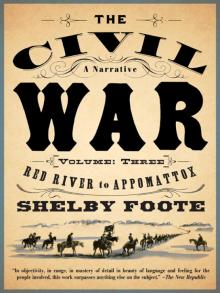 The Civil War: A Narrative: Volume 3: Red River to Appomattox
The Civil War: A Narrative: Volume 3: Red River to Appomattox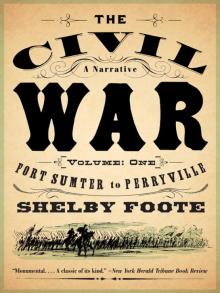 The Civil War: A Narrative: Volume 1: Fort Sumter to Perryville
The Civil War: A Narrative: Volume 1: Fort Sumter to Perryville Jordan County
Jordan County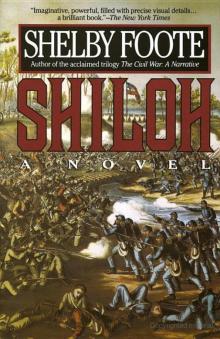 Shiloh
Shiloh Love in a Dry Season
Love in a Dry Season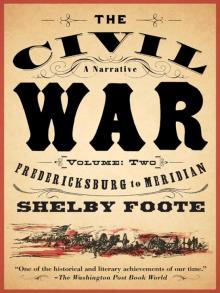 The Civil War: A Narrative: Volume 2: Fredericksburg to Meridian
The Civil War: A Narrative: Volume 2: Fredericksburg to Meridian Chickamauga
Chickamauga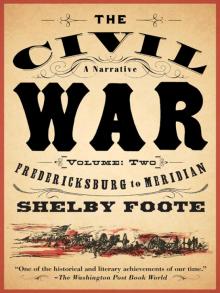 The Civil War: A Narrative: Fredericksburg to Meridian
The Civil War: A Narrative: Fredericksburg to Meridian